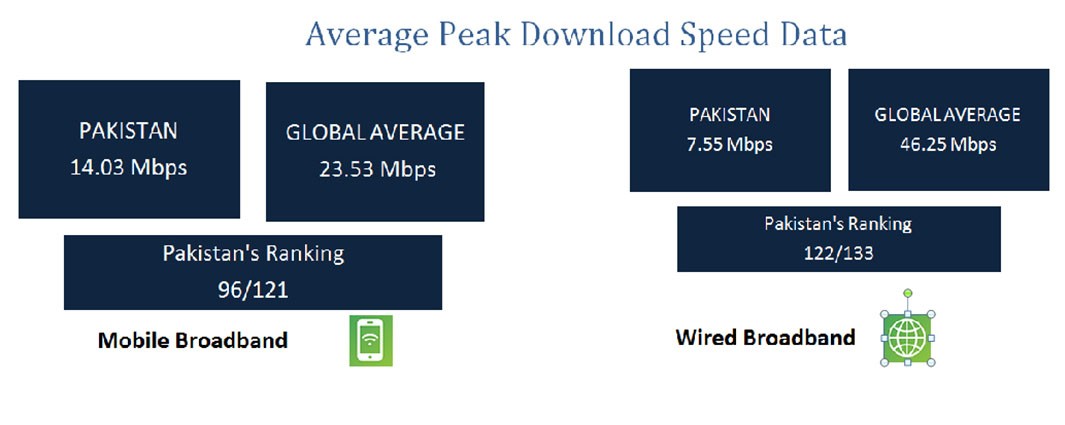Most of the emerging technologies at the heart of the fourth industrial revolution cannot be enabled without high-speed broadband proliferation. Whether it is Virtual Reality, Artificial Intelligence or Autonomous Driverless Cars, etc. all need access to centralized computing resources using high bandwidth and low delay connectivity.
In this article, I examine the state of broadband connectivity in Pakistan including global rankings in broadband penetration and the way forward for the country. Though the minimum speed of Broadband connection has evolved over time, most commonly used applications require bandwidths greater than 1 Mbps.
This challenge of deep fiberization cannot be met by the ICT industry alone, close cooperation between Federal Government and the Industry will be the key. Federal subsidies, Telecom tax breaks and Policy initiatives will be needed to make broadband projects feasible.
The infographic gives a rough estimate of Bandwidth demand for various applications. Pakistan Telecommunication Authority maintains data of broadband penetration in Pakistan across all mobile and wired service providers. The latest numbers indicate that we have about 58 Million Broadband subscribers, however, a deeper look reveals some interesting trends:
Although 75% of our population has access to basic voice telephony, broadband numbers are much lower. We have 28% Mobile Broadband Internet penetration which puts us at around #75 when ranked globally. Mobile Broadband spectrum auctions in 2014 helped spur broadband growth; however, there is still a dire need to speed up the process of deploying Mobile Networks.

Only 1.7% of Broadband subscriptions are connected via Wired Broadband. This indicates that the hunger for Broadband is being fulfilled pre-dominantly by Mobile Broadband for both home and business internet solutions. As a matter of fact, Pakistan’s rank for wired broadband penetration is around 150.
Looking at another recent report on global broadband rankings published by Economist in their report “The Inclusive Internet Index: Measuring Success 2018” ranks Pakistan as 68th on a global index of 86 countries. A deeper look reveals that our challenges are with Availability where we rank 77th, ahead of only Nepal and Maldives.
Read more: Pakistan crosses 150 million mobile subscribers milestone
On the brighter side, we farewell on Affordability at 43rd (which is a double-edged sword as I will explain later). This industry trend to overuse Mobile Broadband is not scalable, especially for business consumers. The best consumer and business broadband globally is delivered over fiber connections. There is a dire need to expand wired broadband infrastructure in Pakistan.
Wired Broadband Service providers offering high bandwidth solutions based on Telephone (DSL) and Cable media are challenged by the physics of copper infrastructure, limiting what they can offer to consumers. Fiber medium is a pre-requisite for business-grade Gigabit GPON Solutions offering Voice, Data and High Definition video content.
It is interesting to note, that even deployment of Mobile Broadband 4G and 5G base stations needs fiber connections to backhaul the traffic to central switching centres. Service Providers globally rely on fiber connectivity to all LTE/4G base stations and fall back to microwave links only as a secondary option.

One of the many factors affecting the peak download speed of Mobile users is backhaul connectivity, which in Pakistan’s case is mostly microwave. User collected data from actual SpeedTest shows how Pakistan fares on Average peak download speeds(see below). In order to make progress on Broadband penetration, there are key challenges that need to be tackled urgently.
Pakistan lacks effective tariff and policy controls on Right of Ways for laying fiber. Service Providers have to negotiate with each city, jurisdiction, NHA, township that fall in the proposed fiber path. In addition to the delay and effort involved in the one on one negotiations, these entities can demand any rate from the service providers.
Though the minimum speed of Broadband connection has evolved over time, most commonly used applications require bandwidths greater than 1 Mbps. The infographic gives a rough estimate of Bandwidth demand for various applications.
A national tariff control policy on Right of Way is a necessity for quicker development of ICT in the country. A number of countries in our region already have a National Right of Way policy. We must recognize fiber connections as a public utility conduit without which we cannot lay the foundation for a modern ICT infrastructure. Without such a policy, fiber projects will continue to be expensive and take much longer time to complete.
For the Telecom sector to flourish, the heavy taxation levied on the sector needs to be eased. Number of countries globally have started 5G trials, with commercial deployments starting in 2019. A favourable tax treatment to incentivize investments in 5G infrastructure equipment and associated services can be offered conditionally to technology transfer.
Pakistan has an opportunity to attract foreign direct investment by opening up trial spectrum licenses as an early adopter of 5G Mobile Broadband. Laying fiber, building base stations and bidding for licenses is a capital extensive exercise. As mentioned earlier, Pakistan fares well in the Affordability of Broadband (Ranked #43/86) due to tough competition between service providers.
While this is great for the consumers, these low revenues do not help the service providers business case to invest in the networks both for expansion and quality improvements. The role of Government policy and financial intervention in the shape of public-private partnerships is essential to help overcome these challenges.
There are vast populations and geographies in our country which lack a commercial business case for Broadband deployment. In Pakistan, the Ministry of IT and Telecom helps the industry with financial intervention by allocating Universal Service Funds to pay subsidies for the provision of Broadband services in un/underserved areas of the Country.
Read more: Pakistan getting ready to ride the ‘Digital wave’
Allocation of these grants and subsidies is vital to taking broadband penetration beyond urban centers. In order for Pakistan to prepare for the 4th Industrial Revolution and 5G Mobile Broadband, we must enable a modern ICT infrastructure.
This challenge of deep fiberization cannot be met by the ICT industry alone, close cooperation between Federal Government and the Industry will be the key. Federal subsidies, Telecom tax breaks and Policy initiatives will be needed to make broadband projects feasible.
A 2015 study done for the World Development Report has shown that government investment in mobile and fixed fiber has its own payoff, every 10% increase in broadband penetration leads to a GDP growth of 1.38% in developing countries. The dream of a Digital Pakistan will remain elusive if we do not fulfil the pre-requisite of high bandwidth internet availability for majority of our population.
Mr. Rizwan M Mir is the Chief Executive Officer of Universal Service Fund. He has about 20 years of broad domain expertise across IT and Telecom with fortune 500 companies. He has held several functional leadership roles in Business Development, Marketing, Partnerships, Operations, Professional Services and Software Development at Radisys, Ericsson and Alcatel-Lucent. He has an MBA and MSEE as well as an IEEE conference publication. He was the recipient of Ministry of Science & Technology prestigious scholarship for higher studies in the USA in 1995.
The views expressed in this article are author’s own and do not necessarily reflect the editorial policy of Global Village Space.


